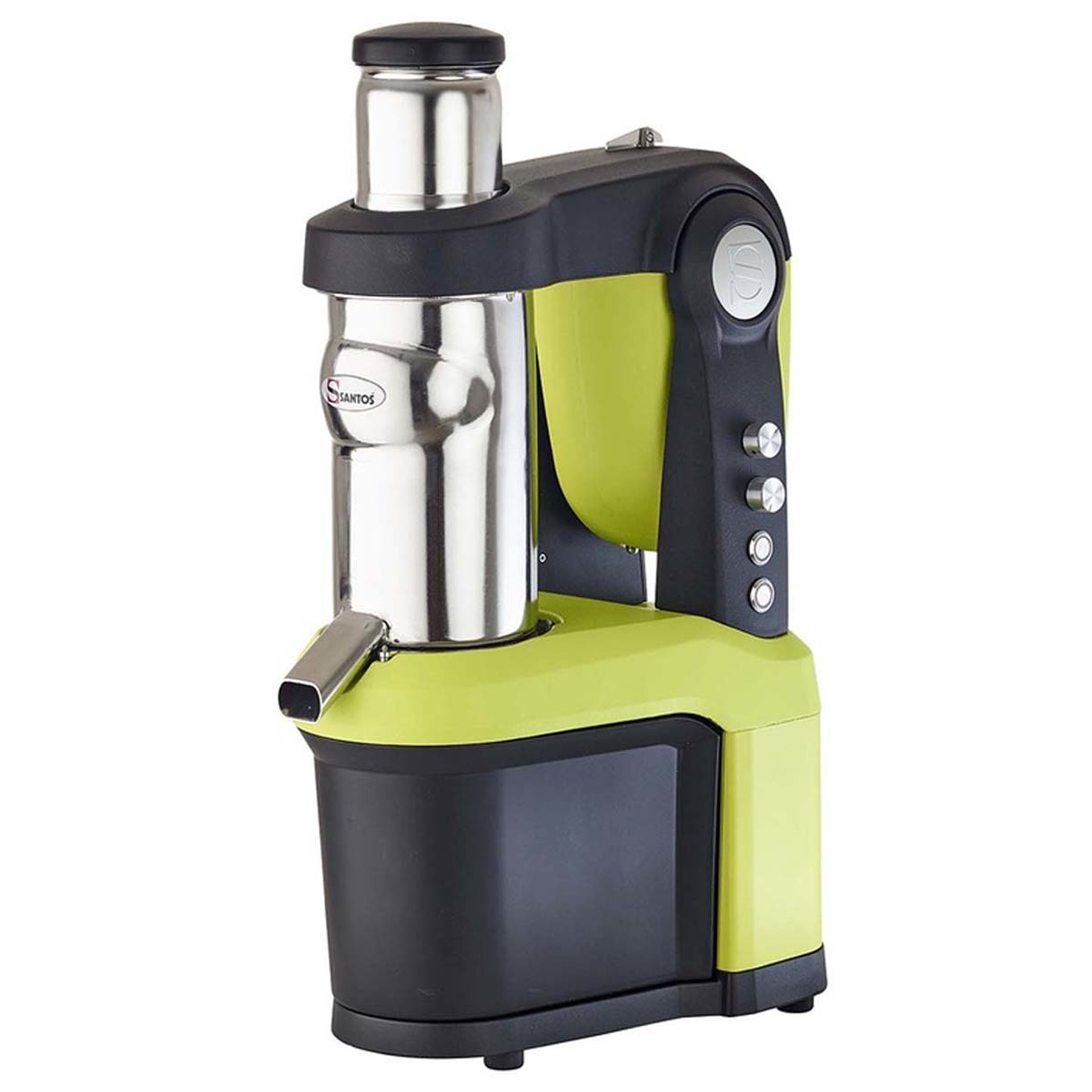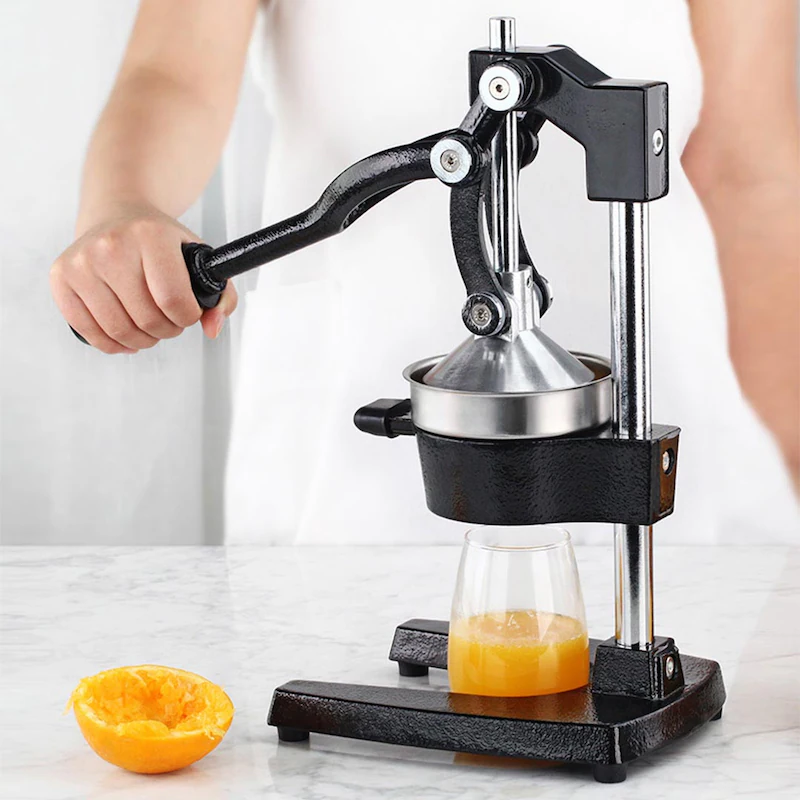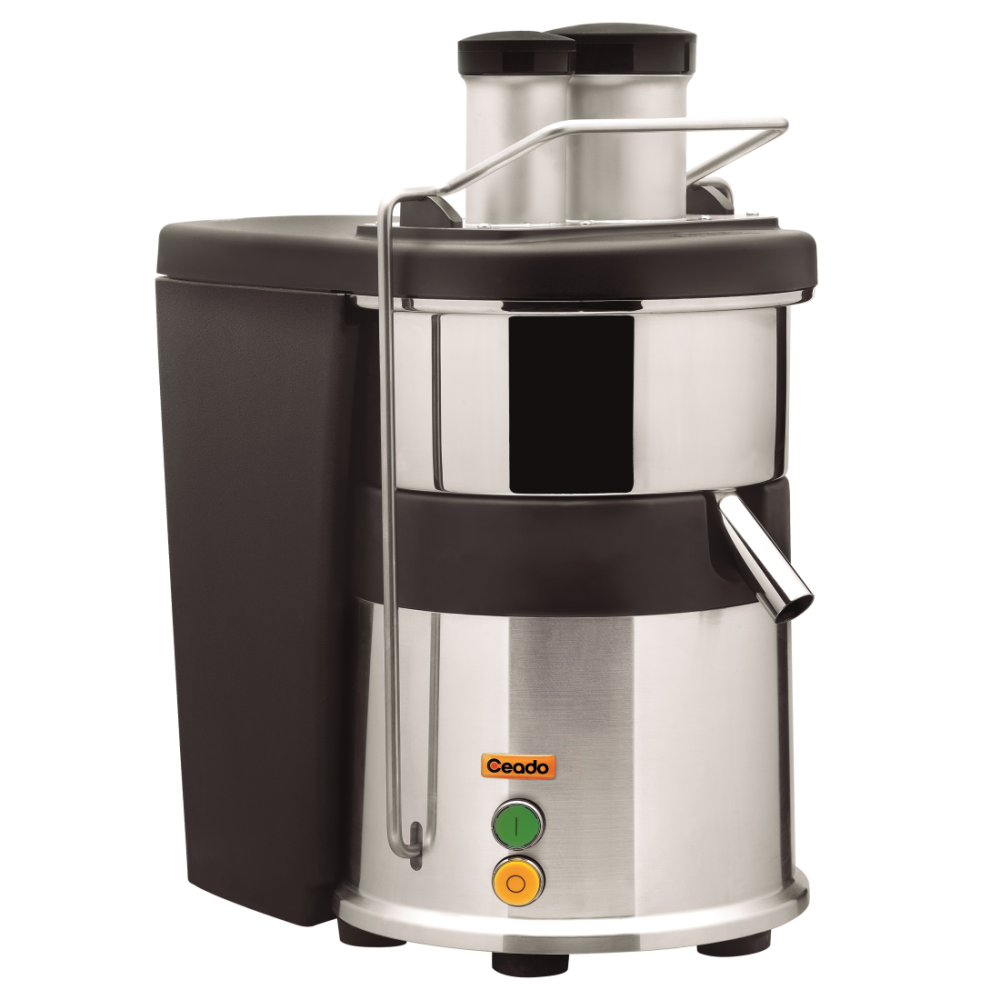Types of Commercial Juicers
When selecting a commercial juicer, it’s essential to understand the different types available. Each type offers unique features and suits different business needs. Let’s explore the most common types.

Centrifugal Juicers
Centrifugal juicers are popular for their speed. They work by spinning fruits and vegetables at high speeds. The centrifugal force separates the juice from the pulp. They are ideal for busy environments due to their quick processing time. However, they may not yield as much juice as other types and can be louder.
Masticating Juicers
Masticating juicers, also known as cold-press juicers, operate slowly. They crush and press produce to extract juice and they work well with leafy greens and yield high-quality juice with more nutrients. They are quieter than centrifugal juicers but juicing takes longer.
Triturating Juicers
Triturating juicers, or twin-gear juicers, have two gears that grind produce. They extract high amounts of juice and preserve nutrients excellently. Triturating juicers handle a variety of produce, including tough, fibrous vegetables. Despite their high efficiency, they come with a higher price tag and are more complex to operate.
Citrus Juicers
Citrus juicers are specialized for citrus fruits like oranges and grapefruits. They are simple to use and can quickly produce fresh juice. Most models are manual, but electric options are available for higher volumes. They are affordable and easy to clean, making them a good choice for establishments focusing on citrus beverages.
Factors to Consider When Selecting a Juicer
Selecting the right commercial juicer for your business involves weighing various factors. These considerations help ensure that the machine you choose meets your operational needs and service expectations. Here’s what to look out for.
Ease of Use
A user-friendly juicer can streamline your workflow. Look for machines with simple interfaces and straightforward assembly. Quick setup and operation are key for busy commercial settings. Features like large feeding chutes can also minimize prep time.
Juicing Speed
Speed is crucial, especially during peak hours. Centrifugal juicers are fast but may compromise on yield. If you prioritize quick service, these might fit the bill. Conversely, slower juicers like masticating and triturating types take longer but offer better quality juice.
Volume and Throughput
Consider your daily juice volume needs. High-volume businesses need a commercial juicer that keeps up with demand. Machines designed for heavy use without overheating are what you should aim for.
Durability and Warranty
A sturdy juicer can withstand constant use. Choose a juicer built with durable materials. Also, check the warranty. A longer warranty can offer peace of mind and protection for your investment.
Noise Level
Noise can affect the ambiance of your space. Masticating juicers are quieter, while centrifugal models can be loud. Reflect on your environment’s needs when deciding on the importance of noise level.
The Importance of Yield and Juice Quality
Selecting the right commercial juicer isn’t only about speed and ease of use. Juice yield and quality are also paramount. High yield means more juice from less produce, which can improve profit margins. Juice quality affects taste, color, and nutrient content, which are critical for customer satisfaction.
Juice Yield Comparisons
Different juicers produce varying amounts of juice from the same amount of produce. Centrifugal juicers are speedy but may offer lower yield compared to others. Masticating and triturating juicers excel in extracting more juice, making them a wiser choice for maximum output. Always weigh the produce used against the juice extracted to gauge efficiency.
Impact on Nutrient Retention
A juicer’s impact on nutrient retention is vital for health-conscious customers. Cold-press or masticating juicers preserve more nutrients due to their slow juicing process. They limit heat and oxidation, which can degrade delicate vitamins and enzymes. This results in a more nutrient-dense juice. Triturating juicers also maintain high nutrient levels, offering top-quality juice for your clients.
Cleaning and Maintenance
Keeping your commercial juicer in top condition is crucial for longevity and reliability. Effective cleaning and regular maintenance can greatly impact its performance and durability.
Ease of Cleaning
A juicer that’s easy to clean will save you time and ensure that your appliance is ready for use without delay. Look for juicers with fewer parts and removable components, as these can simplify the cleaning process. Models that are dishwasher-safe or come with specialized cleaning tools can further speed up the process. Cleanliness is also important for health standards, so choose a juicer that can be thoroughly sanitized between uses.
Maintenance Requirements
Beyond cleaning, your commercial juicer will require regular maintenance to operate efficiently. Choose a juicer with easily replaceable parts and one that doesn’t need frequent servicing. Read the manufacturer’s guidelines for maintenance schedules and abide by them to avoid unexpected breakdowns. Often, regular checks and prompt replacement of worn out components can extend the lifespan of the juicer. A reliable vendor should offer easy access to necessary parts and service if needed.
 Price vs. Performance
Price vs. Performance
When investing in a commercial juicer, balancing cost against functional performance is key. It’s about finding the right mix that doesn’t skimp on quality while adhering to your budget constraints. The price of a juicer can range significantly based on type, brand, and features. Yet, what sometimes looks like savings in the short term can lead to higher costs later due to maintenance, repairs, or inefficiency.
Budget Considerations
Start by setting a clear budget for your juicer purchase. Cheaper models might be tempting, but they could lack durability or efficiency. In contrast, expensive juicers might offer more features than you actually need. Focus on the must-have features that align with your business’s operational demands. Calculate the cost-per-use by dividing the price by the expected number of uses to gauge real value.
Reflect on potential hidden costs as well. This includes energy consumption, maintenance fees, and replacement parts. A higher upfront cost can sometimes mean lower overall expenses. Choose a commercial juicer that offers a good balance between price and the necessary features for your daily operations.
Long-term Cost Benefits
Think beyond the initial purchase price. A more expensive juicer might yield more juice per fruit, saving money on produce in the long run. Additionally, a juicer that operates efficiently and has lower maintenance needs can reduce long-term operational costs.
Assess the warranty length and what it covers. A longer warranty may eliminate or reduce repair costs, offering financial benefits over the juicer’s lifespan. A model known for its reliability and longevity can also prevent the frequent need for replacements. When evaluating juicers, also consider the resale value if you need to upgrade or replace equipment in the future.
Invest smartly by opting for a commercial juicer that balances initial costs with efficient performance, durability, and lower long-term expenses. The goal is to ensure your investment contributes to profitability and seamless operation in your business.
Additional Features and Accessories
Choosing a commercial juicer is more than picking a powerful machine. It’s also about the added features and accessories that can enhance its functionality. Consider the additional elements that can make juicing more efficient for your business.
Pulp Ejection Systems
A pulp ejection system can be a game-changer in your kitchen. This feature allows continuous juicing without stopping to empty the pulp. It’s highly beneficial for high-volume businesses. Machines with an automatic pulp ejection feature save time and increase productivity.
Multiple Speeds and Settings
Juicers with varying speeds and settings give more control over the juicing process. They let you optimize the extraction according to the produce used. This can be crucial for preserving the quality of different types of juices. It also reduces the risk of over-processing and wasting ingredients.
Built-in Safety Features
Safety should never be overlooked when selecting a commercial juicer. Look for juicers with built-in safety features like a locking system and overload protection. These prevent accidents and ensure the machine operates safely, which is essential in a bustling commercial environment.
 Popular Brands and Models
Popular Brands and Models
Selecting a commercial juicer involves familiarizing oneself with the market’s leading brands and models. Knowing the reputable players in the industry can guide you in making a well-informed decision. Let’s delve into some of the top brands that have established themselves as reliable sources for quality juicing equipment.
Market Leaders
When exploring various commercial juicer brands, several names consistently rank as market leaders. These companies have a reputation for producing durable, efficient, and high-performing machines. They include brands like Omega, Santos, Robot Coupe, and Breville. Their products are known for long-term reliability, extensive warranties, and strong customer support. Additionally, many offer a range of models to suit different business needs, from low-volume cafes to high-demand juice bars.
Customer Reviews and Recommendations
Customer feedback is a goldmine of information. Before making a purchase, scrutinize reviews and testimonials for insight on performance and user satisfaction. Pay attention to comments about the juicer’s longevity, actual juice yield versus advertised, and ease of cleaning and maintenance. Direct recommendations from fellow business owners can also be invaluable. They can provide honest opinions on how certain models stand up to the rigors of commercial use. Leverage social media, online forums, and professional networks to gather as much information as possible. This will help ensure you choose a commercial juicer that’s well-regarded by those who use it daily.
